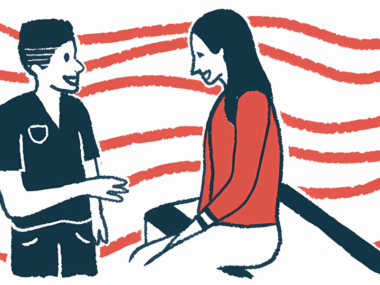By Learning to Shift Perspective, We Can Change What’s Possible
Written by |

I hate exercise! Both my pain and fatigue increase when I exercise. These are disabling Parkinson’s disease symptoms, and both trigger the fight-or-flight response that often manifests as “the grouch.” I have not found an easy way of exercising with Parkinson’s pain and fatigue, but I have found ways to shift my perspective. Shifting perspective opens up the possibility of experiencing enjoyment from exercise.
One of the most important parts of a Parkinson’s wellness map is exercise. But here’s the catch: It’s difficult to do with regularity. We know it works! Yet, knowing what is good for wellness is not the same as doing it. The doing part of exercise — showing up three to four times a week — is difficult with all the chronic disease barriers. It’s easy to feel defeated before even starting.
The way around this apparent Catch-22 is to shift one’s perspective on exercise. I mentioned the idea of shifting perspective in connection to wellness in a column about moments of well-being. The shift I need with regard to exercise is one that will get me off the sofa and into exercising. I am not getting off the sofa to do something I hate, but rather to do an enjoyable, creative project that involves exercise: landscaping to produce gardens. It’s a good exercise to keep the trunk strong, which helps prevent falls.
It takes a bit of perseverance to get into my work clothes, strap on the heavy work boots, find the hat and sunglasses, and then head out the door. Surveying the work ahead — which is sometimes a bit daunting — I start with light work to warm up. Walk, then shovel, and maybe rake, before getting behind the wheelbarrow to move gravel or dirt from one location to another. Pause to hear the birds sing, marvel at the variety of flower blooms and fragrances. Pretty quickly, the world slips away, replaced by the Zen of gardening.
My Fitbit reminds me when a time for medication is coming up and keeps track of my heart rate. I take lots of water breaks! By the time two hours have passed, my work shirt is drenched with sweat — as much as, if not more than, the amount of water I’ve consumed. In the Zen garden moments, the mind is free of the worries of Parkinson’s and vision problems. That feeling remains with me, not as a false euphoria, but as a deep-rooted sense of well-being.
There are many ways that shifting perspective can open wellness possibilities. A nurse shared a wonderful example. She was a smoker from her early teen years, and now in her 30s, she decided to quit. Six months without a smoke and she says, “I had this memory of how much I enjoyed smoking.” So, she bummed a cigarette and immediately got sick from smoking it. Recounting the event, she says, “I can remember the horrid feeling as clear today as if it just happened. I never had the urge to smoke again after that.” She shifted her perspective from enjoying smoking to thinking of it as a horrid, sickening experience. Shifting perspective opened up the possibility of wellness.
There is research supporting the practice of shifting perspective in a way that promotes well-being. The placebo effect is a mind/body interaction where the patient is convinced of treatment efficacy, which is a shift in perspective. Also, in many cases of “miracle” disease remission, a common theme is the patient’s ability to shift perspective. Reframing a problem can provide a new perspective and lead to new solutions.
The ability to shift perspective may also improve our ability to adapt to stressful times and to become more resilient, and therefore more open to new possibilities. The shifting of perspective causes us to shift our focus to a new intention, a new possibility. I hated exercise, and my intention was to avoid it. The shift in perspective offered the new intention of enjoyment and the possibility of a beautiful garden, along with a healthier body, in spite of the chronic disease limitations.
How has the ability to shift your perspective helped you? Please share your story in the comments below.
***
Note: Parkinson’s News Today is strictly a news and information website about the disease. It does not provide medical advice, diagnosis or treatment. This content is not intended to be a substitute for professional medical advice, diagnosis, or treatment. Always seek the advice of your physician or another qualified health provider with any questions you may have regarding a medical condition. Never disregard professional medical advice or delay in seeking it because of something you have read on this website. The opinions expressed in this column are not those of Parkinson’s News Today or its parent company, Bionews Services, and are intended to spark discussion about issues pertaining to Parkinson’s disease.






Georgia Mark
I found this article particularly helpful.
I have shifted my perspective about exercising as well.
If it were just me having to exercise, I think I would stay home and lie on the sofa. But I have a little dog who tends to be on the chubby side and I know and see how walking helps her. She really enjoys the walks and it gives me joy to see her happy. So out we go, two or three times a day, every day, and we're both happy.
Dr. C
Great post! Your story illustrates just what the column was about. It also speaks to another problem I will write about soon - motor initiation (getting up off of the sofa). Give your walking partner a hug from Dr. C.
David Rafuse
At last , after two years of severe pain with exercise , it has been noted that the same pain is felt by
another Parkinson's person . Change perspective has been in effect for 7 months
and my second replacement hip is coming up in the next month .
Dr. C
How did you apply the "change in perspective"? The details might be helpful to other readers. Thanks for the post.
Marlene Donnelly
Shifting perspective has certainly worked for me with regard to exercising! I have always hated the thought of exercising, but once I was diagnosed and read that T'ai Chi could help with balance, I signed up for a class at my local hospital. That was six years ago, and now I go to a Lite and Fit and a Yoga class besides my T'ai Chi class. I love them all! I have met wonderful people who have become friends and I have a lot of fun at each class, so I make a point of not missing any session, and I can definitely feel the difference physically, mentally, and emotionally. I credit these classes with the slowness of my PD progression and in fact improvements in many areas.
Dr. C
I love the Tai Chi philosophy and have read good research on how helpful it is for PD folks. Your post illustrates the main idea of the column very nicely. Thank you!
Bob Hodgson
One of the things I do to change my perspective is to not allow myself the option to "not" exercise. I view exercise as "my medicine" and as important to my recovery as my medication. I must confess that I love to exercise and have been active for 35 years pre diagnosis.
Dr. C
I'm with you Bob! I use my 2 hours a day of exercise as one of my routines along with the medication schedule. Some days I can't even do 2 hours. Hot days (for me anything above 75 is "hot") I get out to my gardens by 7 am. Before PD I would go rockhounding, cycling, climbing, cross-country skiing. Can't do any of those activities any more. Now I'm happy to make slow but sure progress on my walking path in the woods. Three years and I've got a path that circles the back of the house and along the stream. We will use the path for summer walking and winter trekking. Keep up the good exercise!
Dr. C
I appreciate your comments and think we are of similar mindsets. I have been physically active for many years but I do find now that I must take a rest day when the symptoms get worse. Pushing through the "bad days" just extends my symptoms. So as part of my wellness program, I allow myself a rest day knowing that I will have a shorter downtime and can return to doing those things that I enjoy. Wellness includes time for both physical activity and restful, mindful, activity. Keep up the good work and thanks for reading my thoughts and ideas on wellness in the columns.
Dr. C.
michael wall
I asked my psychologist why I should bother exercising when it wasn't making me any stronger, more limber, or slowing down the progression of Parkinson's in any detectable way. He said "exercise because you still can." That has been a powerful shift in perspective for me. Now when resistance arises, I remember that I exercise because I still can go for a walk, because I still can go for a bike ride. Even now during winter when it's too cold to go out and do those things, I am fortunate to be able to walk on a treadmill or ride an exercise bike and feel the aliveness of my heart pounding from the exertion, and of the sweat pouring off of me "because I still can."